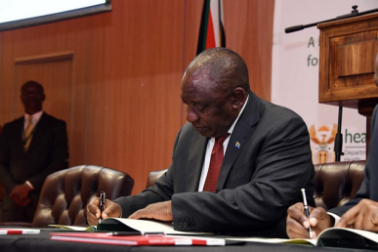The General Intelligence Laws Amendment Bill has been signed into law by President Cyril Ramaphosa. According to the president, the law is meant to lay the foundation for reforms to the country’s intelligence services. The Amendment Act is an update to the National Strategic Intelligence Act of 1994, and the intelligence Services Oversight Act of 1994, the Intelligence Services Act of 2002, and the Intelligence Services Oversight Act of 1994.
Among other reforms, the new law disestablishes the current State Security Agency as a national government department and replaces it with two separate departments. The new departments are:
- The Foreign Intelligence Service (FIS) which shall be responsible for foreign intelligence gathering to identify opportunities and threats to National Security, and
- The Domestic Intelligence Agency (DIA) which shall be responsible for counter-intelligence as well as the gathering of domestic intelligence in order to identify threats to National Security.
The laws make provisions that both the departments will be accompanied by improved oversight and accountability, the president said. The amendment Act also re-establishes the South African National Academy of Intelligence (SANAI) and Intelligence Training Institute for both domestic and foreign intelligence capacities.
The wide-ranging amendments implement the recommendations of the 2018 Presidential High-Level Review Panel on the State Security Agency (SSA) and the Judicial Commission of Inquiry into Allegations of State Capture, Corruption, and Fraud in the Public Sector—also known as the Zondo Commission.
The creation of two separate Intelligence agencies for government intelligence gathering services is an interesting choice. If it leads to the internal intelligence agency monitoring the external one then that is fine. However, who will be in charge of monitoring the Domestic Intelligence Agency?
- The focus of the Foreign Intelligence Service will be on monitoring external threats from outside the domestic sphere.
- The focus of the Domestic Intelligence Agency is to focus on internal threats coming from within the home front.
The new law should also clarify who or what institution or department will be monitoring the new state intelligence branches. Will it be the Hawks under the control of the regular Police Department or could it be the National Prosecuting Authority (NPA) which has no enforcement mechanism for its investigations.
The reason for Ramaphosa signing the new law is to combat and discourage the encroachment of state capture. However, the question boils down to who will bear the responsibility of monitoring ambitions of cabinet ministers and businessmen to influence government departments to those ends?
Meanwhile when it comes to external threats the country has to deal with the imposition of tariffs by the United States and its President Donald J. Trump.
South African business sentiment remained in contractionary territory for a fifth straight month as a recovery in demand struggles to pick up pace amid uncertainty about deteriorating relations with the US. Absa Group’s Purchasing Managers’ Index, compiled by the Bureau for Economic Research, rose to 48.7 in March — below the 50 level that indicates an expansion and compared with 44.7 in February, the Johannesburg-based lender said Tuesday in an emailed statement. “Comments from respondents indicate that logistical issues at the ports remain, and souring relations with the biggest economy in the world is bringing uncertainty – although it may not be affecting trade at the moment,” it said.
The warning signs are present. Trump is asserting his dominance. He is using the tariffs to blackmail South Africa into giving up pursuing the case against Israel for Genocide in Gaza. This in turn can be associated with other motives for the tariffs. This includes the ANC led government’s desire to pursue some form of land reform presumably with or without compensation. What ever the case the tariffs will risk isolating the US from its closest ally in Africa. South Africa in terms of the bulk of the populace will feel the affects of this trade embargo soon enough. The manufacturing sector could suffer the most. There needs to be diplomatic dialogue on the issue to avert disaster. For now there has to be patience.
Article written by:
Yacoob Cassim
Journalist at Radio Al Ansaar






